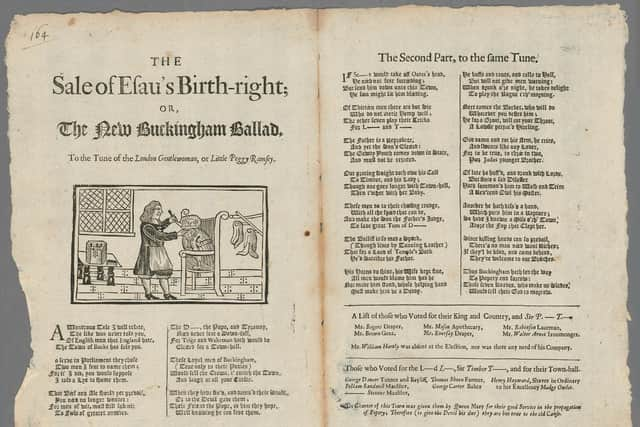Aylesbury Vale song named one of the best of the 17th century in national history project
and live on Freeview channel 276
A song mocking parliamentary candidates in an Aylesbury Vale town has been named as one of the best songs of the 17th century.
The Sale of Esau’s Birth-right, which is also known as the New Buckingham Ballard, came sixth in the top of the seventeenth century pops.
Advertisement
Hide AdAdvertisement
Hide AdChristopher Marsh, a history professor at Queen’s University, Belfast, and Angela McShane, an honorary reader in history at the University of Warwick, have put together a first of its kind ‘Top of the Pops’ chart for songs from the 1600s.


History buffs can listen to the song on the historians’ website, which also offers informative breakdowns of some of the era’s other influential hits.
Christopher has described it as a complicated, but amusing song. It was written, by an unknown author, in response to a controversial election in Buckingham in 1679.
Where a parliamentary candidate is accused of trying to buy votes after the King declined to accept the results of a previous selection. It also alleged that the original vote was tampered with, as the duke of Buckingham, got the bailiff drunk to promote his prefered candidate.
Advertisement
Hide AdAdvertisement
Hide AdAngela McShane writes that the song successfully libels both candidates and the officials who voted for them. “It castigated their actions as political treason,” she said.
Rather than stand up for ‘their King, Country and Protestant Religion’, they had elected men who would ‘le[a]d the way to Popery and sorrow’, according to the song.
The ballard highlights divides in the country at the time with anti-court and pro monarchy parties clashing, and also the division between protestants and catholics.
"It was not only an entertaining libel, but also a way of keeping the corrupt circumstances of the borough election fresh in the county's minds,” Angela adds.
Advertisement
Hide AdAdvertisement
Hide AdChris explained the inspiration for the project, which also has songsheets, as well as the new recordings and analysis of the old songs, to the Guardian. He said: “This was the earliest form of commercial pop music in England. It was the first time in history that people tried to publish songs to make money, to make hits.”
